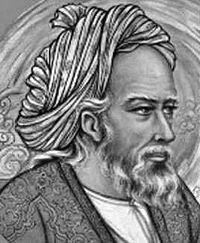Happy Birthday, Omar

Today in Nishapur, Iran, Omar Khayyám (عمر خیام) was born in 1048.
One of the great Iranian - heck, world - polymaths, he was a famed philosopher, a scientist, and a mathematician: his treatise on algebra, the Treatise on Demonstration of Problems of Algebra, is considered one of the greatest mathematical works of the Middle Ages. He even experimented with non-Euclidean geometry. But today we (in the West, at least) know him for his Rubáiyát — the word is the name of the verse form, so The Rubáiyát is like saying "The Sonnets"; you really need to name the author.
And on that note ... the most famous translation is the least faithful; Edward FitzGerald picked and chose and conflated and edited (particularly Khayyám's preoccupation with mortality and his questioing of God), and gave the Rubáiyát the quatrain form we now associate with the word, though the original Persian rubái FitzGerald made no secret of his "transmogrification", to use his own word. "I suppose very few People have ever taken such Pains in Translation as I have: though certainly not to be literal. But at all Cost, a Thing must live: with a transfusion of one’s own worse Life if one can’t retain the Original’s better. Better a live Sparrow than a stuffed Eagle."
Herewith what is arguably the most famous stanza, in several translations:
FitzGerald, 1859
Here with a Loaf of Bread beneath the Bough,
A Flask of Wine, a Book of Verse - and Thou
Beside me singing in the Wilderness -
And Wilderness is Paradise enow.
FitzGerald, 1879
"A Book of Verses underneath the Bough,
A Jug of Wine, a Loaf of Bread--and Thou
Beside me singing in the Wilderness--
Oh, Wilderness were Paradise enow!"
Edward Henry Whinfield, 1883
In the sweet spring a grassy bank I sought
And thither wine and a fair Houri brought;
And, though the people called me graceless dog,
Gave not to Paradise another thought!
John Leslie Garner, 1888
Yes, Loved One, when the Laughing Spring is blowing,
With Thee beside me and the Cup o’erflowing,
I pass the day upon this Waving Meadow,
And dream the while, no thought on Heaven bestowing.
Justin Huntly McCarthy, 1888
In Spring time I love to sit in the meadow with a paramour
perfect as a Houri and a goodly jar of wine, and though
I may be blamed for this, yet hold me lower
than a dog if ever I dream of Paradise.
Edward Heron Allen, 1888
I desire a little ruby wine and a book of verses,
Just enough to keep me alive, and half a loaf is needful;
And then, that I and thou should sit in a desolate place
Is better than the kingdom of a sultan.
Robert Graves and Omar Ali-Shah (spuriously claimed to be based on a 12th c. manuscript but actually on Heron Allen's work)
A gourd of red wine and a sheaf of poems —
A bare subsistence, half a loaf, not more —
Supplied us two alone in the free desert:
What Sultan could we envy on his throne?
Karim Emami, 1988:
In spring if a houri-like sweetheart
Gives me a cup of wine on the edge of a green cornfield,
Though to the vulgar this would be blasphemy,
If I mentioned any other Paradise, I'd be worse than a dog.
And these are just the best known English translations - Khayyám's poetry has been translated into many other languages.
Labels: birthdays, poetry, translation





























4 Comments:
-
At 2:21 PM, May 18, 2009
 Deborah Godin had this to say...
Deborah Godin had this to say...
-
-
At 6:17 PM, May 18, 2009
 The Ridger, FCD had this to say...
The Ridger, FCD had this to say...
-
-
At 6:47 AM, May 22, 2009
 Anonymous had this to say...
Anonymous had this to say...
-
-
At 6:53 AM, May 22, 2009
 Anonymous had this to say...
Anonymous had this to say...
-
-
<-- Older Post ^ Home Newer Post -->I can't say a word about the accuracy of any translation, only that I was imprinted early and raised on the first Fitzgerald one you listed. I might learn to like things about the others, but they will never be 'home.' I think "...and Thou Beside me singing in the Wilderness..." is one of the best lines. Ever.
Me, too. I love the FitzGerald. FitzOmar, one of my professors called it.
The Rubaiyat of Omar khayyam is a world within the heart of goblet. Khayyam is the messenger of awakening leading people toward enjoying and being happy (hedonism) as the only purpose of life. Time goes on so much the better to goes on with joy; it's crystal clear that by the passage of time we will be non-existent so much the better to be non-existent with fulfilled Heart's Desire.
'As then then the Tulip for her wonted sup/Of Heavenly Vintage lifts her chalice up,/Do you turn offering of the soil, till Heav'n/To Earth invert you - like an empty Cup.'
The Rubaiyat of Omar khayyam is a world within the heart of goblet. Khayyam is the messenger of awakening leading people toward enjoying and being happy (hedonism) as the only purpose of life. Time goes on so much the better to goes on with joy; it's crystal clear that by the passage of time we will be non-existent so much the better to be non-existent with fulfilled Heart's Desire.
"As then the Tulip for her wonted sup/Of Heavenly Vintage lifts her chalice up,/Do you turn offering of the soil, till Heav'n/To Earth invert you - like an empty Cup." * "It's early dawn, my love, open your eyes and arise/
Gently imbibing and playing the lyre;/
For those who are here will not tarry long,/
And those who are gone will not return."
Post a Comment
Subscribe to Post Comments [Atom]